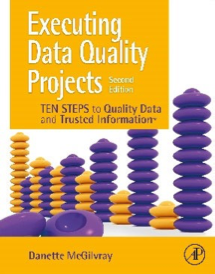Executing Data Quality Projects.
A course for those serious about data quality
Based on the book:
Executing Data Quality Projects: Ten Steps to Quality Data and Trusted Information™ 2nd Edition (Elsevier/Academic Press, 2021)
by Danette McGilvray

Why This Course
We live in a data‐dependent world. We MUST have data and information to survive. And the better the quality of the data, the better we can make decisions and take effective actions for the sake of our societies, families, ourselves as individuals, and our organizations. The need for high‐quality, trustworthy data in our data‐dependent world will not go away. This course provides not just what should be done, but how to address the problems of poor‐quality data.
Overview
Simply put, information quality is providing the correct set of accurate information, at the correct time and place, to the correct people. However, ensuring quality information is far from simple. Whether you are just starting a project or are already in production, it is not unusual to find that data quality issues prevent organizations from realizing the full benefit of their investments in business processes and systems.
Join us to learn the Ten Steps to Quality Data and Trusted Information™ – a practical approach to creating, improving, and managing the quality of information critical to running your business, satisfying customers, and achieving company goals. If you are working on real data quality‐related issues that need real results, this is the course for you. What you learn here applies to all kinds of data and every type of organization – for‐profit businesses of all sizes, education, government, healthcare, and nonprofit – because all depend on trusted information to succeed.
Both foundational data quality concepts and practical instruction are included. Be prepared to participate as this is a highly interactive course. Class discussion and exercises (both individual and with teams) are an integral part of the seminar. In addition, attendees have the opportunity to apply what is learned to a course project, chosen from their real data quality situations and concerns. Come with your particular needs in mind, learn how these topics apply to your situation and leave with realistic methods for improving information quality.
This course is based on the extensive experience of the trainer/author/consultant, Danette McGilvray, and her book Executing Data Quality Projects: Ten Steps to Quality Data and Trusted Information™ 2nd
Edition (Elsevier/Academic Press, 2021).
What You Will Learn
After attending the Ten Steps to Data Quality course, attendees will: Have the background needed to conduct their own data quality project using the Ten Steps methodology ‐ a proven approach for creating, improving, sustaining, and managing data and information quality within any organization
Through presentation, group and individual exercises, and a course project, attendees will learn how to:
- Turn data quality challenges into actionable projects that will address critical business needs
- Use business impact techniques to show the value and impact of data quality
- Use data quality dimensions to assess the data that supports business needs and project objectives
- Use root cause analysis techniques to address the true causes of data quality issues
- Use the Ten Steps methodology to create solutions for a variety of issues and concerns (large and small)
- Fit data management topics such as data governance, data modeling, metadata, business rules, master data, reference data, and data standards into the process for ensuring high quality data
- Apply concepts such as the Framework for Information Quality and the information life cycle to data quality management
- Apply templates and examples to address their own data quality concerns
Course Outline
The Data and Information Quality Challenge
- Information and data quality defined
- Approaches to data quality in projects
- The Ten Steps™ methodology – key concepts plus the Ten Steps™ process
Key Concepts – A necessary foundation for understanding information quality
- Framework for Information Quality (FIQ) ‐ Components that impact information quality: 1] Business Goals/Strategy/Issues/Opportunities, 2] Information Life Cycle (POSMAD – Plan, Obtain, Store and Share, Maintain, Apply, Dispose), 3] Key Components that affect information quality (Data, Processes, People/Organizations, Technology), 4] Interaction between the Information Life Cycle and the Key Components, 5] Location (Where) and Time (When and How Long), 6] Broad‐Impact Components (RRISC – Requirements and Constraints, Responsibility, Improvement and Prevention, Structure and Meaning, Communication, Change)
- Information and Data Quality Improvement Cycle (Assess, Analyze, Action)
- Data Governance, Stewardship, and Data Quality
Step‐by‐Step: The Ten Steps™ Process
- Each of the Ten Steps is covered in the seminar with instructions, techniques, examples, templates and best practices
- Data quality tools will also be discussed in the applicable steps
- Exercises and working on a course project with small teams give attendees the opportunity to practice what is learned
Step 1 – Determine Business Needs and Approach
- Define and agree on critical business needs (related to customers, products, services, strategies, goals, issues, or opportunities) within scope which will guide all work done throughout the project
- Plan and initiate the project
Step 2 – Analyze Information Environment
- Gather, compile, and analyze information about the information environment within scope (requirements, processes, people/organizations, data, technology)
- Document and verify the information life cycle, which provides a basis for future steps, ensures that relevant data will be assessed, and helps when identifying root causes
Step 3 – Assess Data Quality
- Design the data capture and assessment plan
- Evaluate data quality for the data quality dimensions applicable to the issue
- The assessment results provide a basis for future steps, such as identifying root causes and needed improvements and data corrections
- Suggestions for selecting the dimensions relevant to the business needs
- The data quality dimensions discussed: Perception of Relevance and Trust, Data Specifications, Data Integrity Fundamentals (uses the technique of data profiling), Accuracy, Uniqueness and Deduplication, Consistency and Synchronization, Timeliness, Access, Security and Privacy, Presentation Quality, Data Coverage, Data Decay, Usability and Transactability
Step 4 – Assess Business Impact
- Using a variety of techniques, determine the impact of poor‐quality data on the business
- This step provides input to establish the business case for improvement, to gain support for information quality, and to determine appropriate investments in your information resource
Step 5 – Identify Root Causes
- Identify and prioritize the true causes of the data quality problems
- Develop specific recommendations for addressing the problems
Step 6 – Develop Improvement Plans
- Finalize specific recommendations for action
- Develop improvement plans based on the recommendations
- Establish ownership for implementation
Step 7 – Prevent Future Data Errors
- Implement solutions that address the root causes of the data quality problems
Step 8 – Correct Current Data Errors
- Implement steps to make appropriate data corrections
Step 9 – Monitor Controls
- Identify and implement controls to be monitored on‐going
- Maintain improved results by standardizing, documenting, and continuously monitoring appropriate improvements
Step 10 – Communicate, Manage, and Engage People Throughout
- Address the human factor of data quality work by Including appropriate communication and engagement activities in every step
- Apply good project management practices throughout the project
Course Materials
Along with the course materials, attendees will receive a copy of the book Executing Data Quality Projects: Ten Steps to Quality Data and Trusted Information™, 2nd Edition, by Danette McGilvray.
The book includes numerous templates, examples, and practical advice for applying the Ten Steps methodology with an easy‐to‐use format that is designed for finding what you need quickly and easily. This will be an excellent reference for future projects and situations they encounter.
Who This Course is For
Individual contributors and team members responsible for or interested in the quality of data in their business processes, systems or databases. This includes roles such as:
- Data Analyst
- Data Quality Analyst
- Business Analyst
- Data Designers/Modellers
- Data Stewards
- Business Process Modellers
- Application Developers
- Architecth
- Any data professional impacting the quality of data upon which their business depends
This class has also proven helpful for:
- Managers and Project Managers of individual contributors and team members; who need to understand what is involved in addressing data quality because they hire resources, assign people’s time, provide support, and remove roadblocks to data queality work.
- Users of data; whose work has been affected by poor data quality and want to find solutions for those problems, such as data scientists who have found themselves in a position of dealing with poor-quality data before they can start the ’real’ job for which they were hired.





